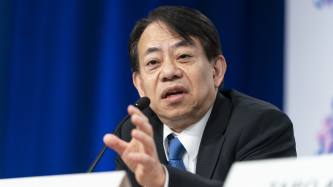Hong Kong: a hugely successful financial centre and an exhilarating city to live in. It has arguably benefited from the 155 years of British rule in terms of cementing its position as a financial capital of Asia, and now left alone it is forging ahead to provide democratic elections and leadership, in stark contrast to its mainland neighbour, China.
But there is a sense of uneasiness about Hong Kong’s future. In September, an idea was mooted about merging the special administrative region with Shenzhen, a southern Chinese city. Seemingly unhappy with already housing seven million people in Hong Kong, a research report by the government-linked Bauhinia Foundation proposed that a mega-city of 20 million people should be created.
There has also been a great deal of speculation over what might happen to the very hub of Hong Kong – its stock exchange. Rumours abound that the Hong Kong stock exchange (HKEx) might merge with Shenzhen (SZSE) and Shanghai (SSE). There are two key reasons for this.
Firstly, China is becoming a force to be reckoned with. The Chinese exchanges are becoming more lucrative and a tale of ‘if you can’t beat them, join them’ is emerging in some parts. This factor has then been buoyed by the activity of other stock markets around the world.
Announcements such as the Tokyo Stock Exchange (TSE) buying a significant stake in the Singapore Stock Exchange in June continuously fuel the speculation about HKEx’s future. But so far Ronald Arculli, chairman of HKEx, has turned down repeated overtures from investment bankers to buy stakes in regional or global rivals.
With a history stretching back to 1871, HKEx is one of Asia’s largest stock exchanges. The clearing and settlement functions are performed by HKEx’s subsidiary, Hong Kong Securities and Clearing, more specifically the Central Clearing and Settlement System (CCASS). CCASS/3 is the latest model to be used. It adheres to international standards for securities messages and provides interactive communication with market participants through a standard message-based application programming interface. The settlement of all transactions is guaranteed in terms of cash and stock delivery and timing is T+2.
Rumour mill
While talk of a merger is still very much at the rumour stage, both HKEx and market commentators have little idea of how the infrastructure would change if HKEx joined with SSE and SZSE.
Logistics aside, when it is considered how strong Shanghai and Shenzhen are shaping up, despite their short histories (they both launched in 1990), a merger could make sense for HKEx.
Statistics show that the Shanghai- listed companies realised a total net profit of RMB512.3bn ($70.8bn) in the first three quarters of 2007, beating the net profit of 2006 by RMB320.2bn.
The Shenzhen stock exchange boasts a similar story. The 488 listed companies posted RMB71bn in net profits in the first nine months of 2007, up 88.71% year on year.
More broadly, mainland Chinese companies raised more than $62bn through share sales in the first three quarters, accounting for more than a quarter of initial public offerings globally, according to Thomson Financial.
Despite such competition, it would be unfair to paint a dire picture of Hong Kong. In the first three quarters of this year HKEx’s listed companies recorded net profits of HK$4bn compared to HK$1.7bn in the same period of 2006. This represents a 140% increase.
However, fears over how powerful the Chinese juggernaut is persist. According to a 2007 report by CLSA Asia Pacific Markets, a provider of brokerage and investment banking services: “There is a sense among some people that Hong Kong can be cast aside as soon as the larger national system gets up to speed, which is why there are sentiments that Shanghai will take over Hong Kong’s role as the premier financial centre one of these days.”
A possible merger would create economies of scale as well as fund-raising capability, which would be a key benefit.
Joseph Tong, CEO of wealth management, capital markets and brokerage at Sun Hung Kai Financial, explains how investors could gain from this: “At the moment, the Chinese markets are not open to foreign investors [including from Hong Kong] – one can only invest in Chinese shares through a restricted QFII scheme. Investors will benefit from having wider investment opportunities if the Chinese stock markets are directly opened up to foreign investors.”
But he points out that uncontrolled participation by foreign investors may not be considered to be desirable by Chinese authorities, and a rapid opening up of Chinese financial markets might create chaos for other world economies.
Facing obstacles
There are many other barriers to overcome to make such an agreement work, and that is even if HKEx is receptive to the idea. Speaking in March last year, Paul Chow, chief executive of HKEx, said there were “no evident synergies” to merge with Chinese stock markets.
“It is one country but has two systems, there are different market models and infrastructure, different regulatory frameworks, the mainland exchanges are not demutualised, the mainland is still largely closed, renminbi is not freely convertible,” says Mr Chow.
The issue of currency seems to be the real hurdle. It is expected that full convertibility of renminbi will only happen in 2010 at the earliest, so it is highly unlikely that any merger will occur before that.
Mr Tong says there are no difficult issues centring on clearing and settlement, but a common legal and regulatory framework is a problem in addition to currency convertibility.
“There could be some means similar to American Depositary Receipts to enable trading of common shares listed in different exchanges, but this is far from being a single trading platform,” Mr Tong told The Banker. “The legal and regulatory frameworks between China and Hong Kong are widely different at present. The issue is not only securities laws but the overall legal systems under which the two different markets operate, including company and relevant commercial laws and legal proceedings.”
Against all these odds, what are the chances it will happen? A lot of the recent noise was generated after the Hong Kong government acquired a 5.8% stake in the exchange in September, making it HKEx’s largest shareholder. Investors heralded the move as a signal that some sort of exchange consolidation was inevitable.
Becoming a major shareholder will boost its influence over the board and help allay mainland authorities, who are reported to be wary of HKEx’s independently elected directors.
Mr Arculli recently hinted that a merger was being explored, but he conceded that any tie-up would have to overcome structural and currency issues. The official line as of December is that there are currently no plans for any mergers or acquisitions, but that it is open to suggestion.
“Any such activity must be shown clearly to benefit all parties involved. When the Hong Kong government increased its stake in the HKEx, government officials said that down the road the government may play a role in co-operating in a merger but we have no comment on it. There is nothing that is going to happen in the near future,” says a HKEx spokesman.
Market experts are also sceptical that a merger could happen in the near future. Christine Loh, one of the CLSA report’s authors and chief executive of Civic Exchange, a local research organisation, says: “I don’t see a merger happening because of the very different nature of the mainland and Hong Kong. The mainland exchanges are ultimately owned by state entities. It is possible to co-ordinate but not to merge.” And Mr Tong notes that a merger is “not feasible and doesn’t make sense”.
Wave of activity
Whether Hong Kong participates or not, Alasdair Haynes, CEO of ITG International, a specialised agency brokerage and technology firm, predicts that a wave of deal activity still seems inevitable in Asia. He says: “In much the same way as European exchanges used technology to position themselves as global market leaders to lure US suitors [in 2004], so we’re seeing technology development form the backbone of many Asian exchanges’ strategic initiatives.
“Electronic trading, algorithms and execution management systems are being made available to domestic investors as well as those global houses now building businesses in Asia. Likewise, the exchanges are assessing their options and building strategies to compete in the global race.”
While improving your technology is often a good idea, HKEx can take heart that the City of London currently ranks it in third place, after London and New York. In the Global Financial Centre Index 2007, Hong Kong sat ahead of Singapore and Tokyo, with Shanghai trailing in 30th place. Shenzhen failed to make the top 50 and was branded “volatile and unpredictable”, but it was also made clear that it was definitely one to watch in the coming years.











